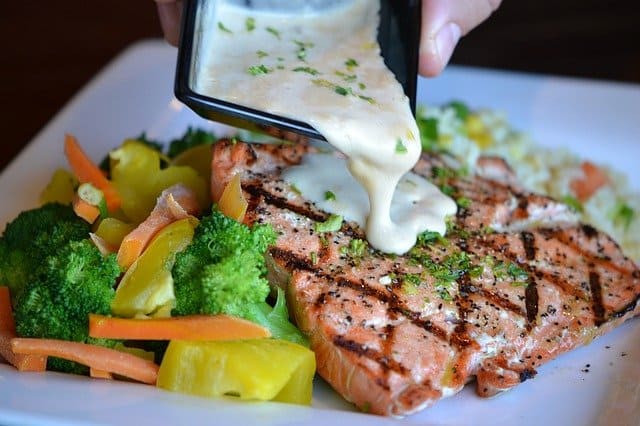Workout diet will help us build fitness, strengthen our body and shape our figure at the same time. It is designed for all people who are physically active, regardless of the type of sport they practice and their level of advancement. Every regular workout is associated with an increased effort, which is why it is so important to provide the body with the right amounts of all nutrients on a daily basis. To achieve optimal physical performance, the body must be well nourished and have high energy reserves. A workout diet is not difficult or demanding, nor does it have to be boring if you use a wide range of products and recipes. What to eat when exercising regularly? How to compose a menu to keep your body in perfect condition?
Table of contents
- 1 Workout diet – who is it for and why should you follow it?
- 2 What are the main principles of a workout diet?
- 2.1 Rule 1: We give up highly processed foods!
- 2.2 Rule 2: Take care of the proper water balance in your body!
- 2.3 Rule 3: Introduce products rich in unsaturated fatty acids into the menu!
- 2.4 Rule 4: Make sure you get enough protein in your menu!
- 2.5 Rule 5: Replenish carbohydrates!
- 2.6 Rule 6: Eat in a balanced way, take care of the right amount of meals!
Workout diet – who is it for and why should you follow it?

For some peopletraining is a way of life, for others it’s a way to get in shape and stay healthy for years, and for still others it’s a way to lose weight or develop muscles. Admittedly, if you want to build muscle mass, a special diet for masses containing a multiplied amount of protein is recommended, but in any other case, for anyA universal training diet based on natural, healthy foods and properly balanced in terms of key nutrients will work for every trainer.
The training diet can of course be modified slightly and the supply of proteins, healthy fats and carbohydrates can be increased or decreased if, for example, the priority is to increase the amount of fat.If, for example, you want to rapidly reduce body fat, sculpt muscle mass or increase endurance, you can modify your training diet slightly. However, the basic principles of a training diet are similar for every person in a training cycle.
A training diet will work for you when:
- you want to lose excess weight,
- you want to increase your physical fitness and develop your motor skills,
- you want to model a shapely, slim figure,
- We want to emphasize our muscles,
- You want to get in shape and get rid of sedentary lifestyles,
- You want to improve your health and rejuvenate your body through training.
Check it out: Fat Burners Ranking
What does a healthy, balanced workout diet offer?
- helps to maintain impeccable physical and mental condition even during intensive workouts,
- has a positive effect on the condition of joints and bones, improves the functioning of the musculoskeletal system
- improves the functioning of muscles, heart and nervous system, and thus increases the efficiency of the body
- protects against deficiencies of important nutrients and body exhaustion,
- protects against hormonal, metabolic and immunological disorders associated with excessive consumption of energy resources,
- makes our mind function better, improves concentration during workouts,
- improves mood, increases motivation to train,
- helps maintain an optimal energy balance,
- improves tissue regeneration processes,
- improves immunity, strengthens the body, helps to carry out training plans more effectively,
- accelerates the process of fat tissue reduction and muscle shaping,
- A properly composed pre-workout meal has a positive effect on energy and strength levels during exercise, and a properly composed post-workout meal has a positive effect on water-electrolyte balance and protects against fatigue and catabolism.
What are the main principles of a workout diet?
Rule 1: We give up highly processed foods!
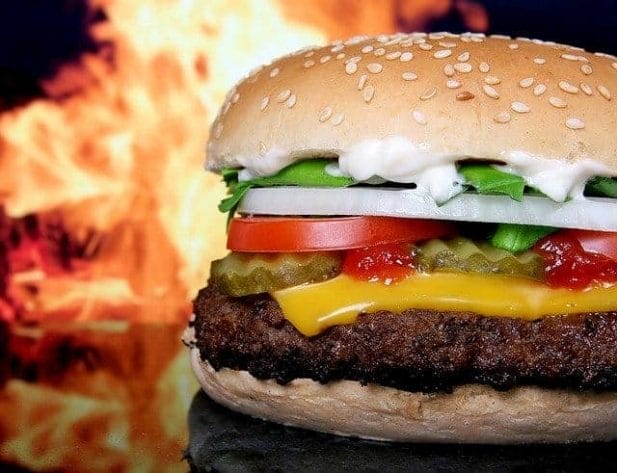
The body of people exposed to physical effort, including those who train, needs increased amounts of individual nutrients in order to function properly. They will not be provided by products belonging to the widely understood processed food. Therefore, leading an active lifestyle, we should avoid processed products, and certainly not make them the basis of our diet.
Much can be said about the harmfulness of highly processed foods, which are abundant both in stores and in fast food restaurants. In processed food we find microscopic amounts of valuable ingredients for us – dietary fiber, protein, vitamins and minerals. But these foods are not free from preservatives, flavor enhancers and other synthetic additives. It also contains a lot of harmful simple sugars, salt, saturated fats and trans fats.
All these unhealthy ingredients disturb the metabolic processes, poison our body, lead to an increase in the level of bad cholesterol, destroy the glucose-insulin balance in the body, promote the accumulation of fat tissue and contribute to acidification of the body.
A diet rich in processed foods is completely incompatible with a healthy lifestyle. Artificial, worthless food can not only significantly interfere with our efforts to model our figure, but also negatively affect our health.
Therefore, the diet for active should be free from such products and dishes as:
- fast food, such as hamburgers, hod dogs, kebabs, pizzas, etc. (if we like this type of food, we can prepare healthy versions ourselves),
- convenience foods,
- toasted bread, pastries,
- buttered buns, ready-made hot dog buns and hamburger buns,
- frozen ready meals (casseroles, pizzas, breaded meat, baked dishes with cheese and sauces, which can be put in the microwave for a few minutes),
- soups and other powdered dishes (ready to eat after pouring in water),
- ready-made meals in a jar,
- ready-made sauces,
- coloured sweet drinks,
- canned foods, pâtés,
- ready-made burgers,
- low-quality meats based on mechanically separated meat,
- sweets (candy bars, cookies, wafers, candies, jelly beans),
- chips, sticks and other salty snacks.
Although the constant presence of such foods in the menu is not advisable, once in a while, of course, you can make a deviation and eat something not quite healthy. The most important thing is that the basis of our diet should be natural, healthy products with the lowest possible degree of processing.
Rule 2: Take care of the proper water balance in your body!
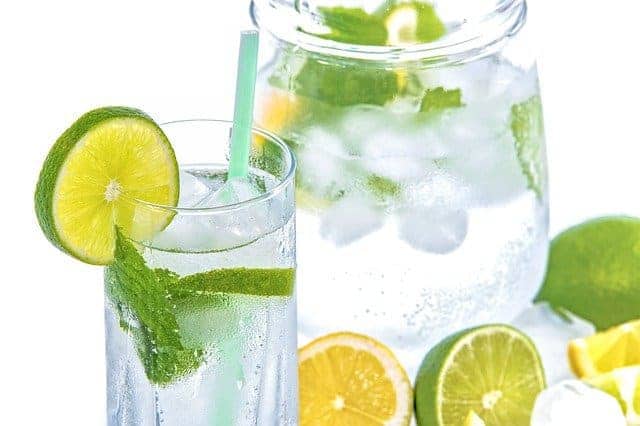
Mineralwater is an indispensable, constant companion of active people (read more about body hydration here: Electrolytes). Each big physical effort results in increased water loss from the body (we lose it intensively with sweat). So have a bottle of mineral water not only during and after training, but also throughout the day. Water guards the correct water and electrolyte balance in the body, improves muscle performance, protects against dehydration and facilitates active detoxification of the body. It also helps to replenish many valuable minerals.
Water is a great way to quench your thirst and a method to improve your mood, increase your vitality and boost your psychophysical performance. Conversely, when we do not consume adequate amounts of water, the body works less efficiently, we are weaker, feel tired and fatigued, and our brain functions less well. Cells are not sufficiently supplied with water, blood volume decreases, toxins are not removed from the body in an optimal way, and the process of conducting impulses between neurons is disrupted.
People who train regularly should consume about 2-3 liters of water per day to avoid dehydration, loss of shape and disorders. When the physical effort is very intensive and there is a lot of sweating, it is worth using not only pure water, but also water mixed with lemon juice, grapefruits, oranges, or other fruit – such drinks are excellent isotonic agents! You can also use ready-made isotonic drinks.
Unsaturated fattyacids (NNKT) are the collective name for higher carboxylic acids containing double bonds. They are not produced by the human body, but are necessary for it to function properly, so they must be supplied in the diet.
Unsaturated fatty acids play many important roles in the human body. Among other things, they strengthen immunity, reduce susceptibility to infections, improve the functioning of the cardiovascular system. They regulate blood pressure, lower cholesterol levels, reduce the risk of heart disease and cancer. They are also responsible for proper functioning of the brain. They improve concentration, increase mental productivity and ensure mental well-being. What is more, they protect eyesight, take care of good digestive system work, improve skin condition.
Unsaturated fatty acids are very important for people who are physically active, and food products which are rich in them should be constantly present in the diet of people who train. Unsaturated fatty acids improve metabolism, help regulate weight and improve the process of fat tissue reduction. They are also a source of energy for the body and have a positive effect on muscle cells. They protect muscles from breakdown, stimulate muscle protein synthesis and help build mass. They also have a positive effect on the condition of bones, joints and tendons.
It is also worth noting that unsaturated fatty acids stimulate tissue regeneration processes, which may be a valuable property for us, especially in intensive workouts.It is also worth noting that unsaturated fatty acids stimulate tissue regeneration processes, which can be a valuable property for us, especially during intensive training cycles, as well as after injuries, strains of muscles and joints or after overtraining.
Products rich in unsaturated fatty acids are:
- fatty marine fish (e.g. mackerel, salmon, halibut, herring, sprat, sardine),
- seafood,
- marine algae,
- fish oil,
- vegetable oils (e.g., canola oil, flaxseed oil, hemp oil, black cumin oil, corn oil, pumpkin seed oil)
- olive oil,
- Nuts (walnuts, pistachios, cashews, peanuts, peanuts),
- almonds,
- grains(chia seeds, sesame, flaxseed, sunflower, pumpkin seeds),
- cereal bran,
- fruits such as avocado, pineapple, grapefruit,
- Legume seeds (e.g., soybeans, chickpeas),
- Vegetables such as kale, spinach, Brussels sprouts, olives,
- dark chocolate.
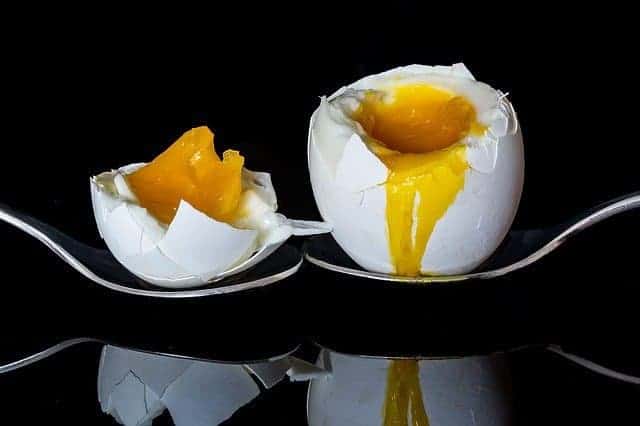
Protein is the basic building material in the body. It is a component of every cell in the body and is essential for the body’s growth and the renewal of worn-out tissues. It also regulates processes in the body, is responsible for immune functions, takes part in the production of antibodies, synthesizes hormones and transports oxygen and iron to the tissues. It is a carrier of some vitamins and minerals. It is also a guardian of proper water balance and proper pH in the body.
Protein is also a guardian of good muscle condition. The amino acids contained in protein are the building blocks of our muscles. Protein ensures proper functioning of muscles (contraction and relaxation) and takes part in blood transport, providing them with the right level of nutrition. It also participates in muscle regeneration processes after training. Without an adequate supply of protein in the diet there is no way that muscles can work properly and expand. Therefore the menu of a training diet should often include products rich in this component.
How much protein a day does the body of a person who trains need? It all depends on your training goals:
- for people training for muscle mass and sculpture, approx. 2-2.5 g of protein per day per kg of body weight,
- for people training for fat reduction and to stay in shape, about 1.6-1.8 g of protein per day per kg of body weight is recommended.
The best sources of protein are:
- meat,
- fish,
- dairy products,
- eggs,
- legumes (beans, peas, soybeans, lentils, chickpeas, broad beans),
- nuts, almonds,
- seeds,
- tofu,
- amaranth,
- quinoa.
Check: Ranking of Supplements for Mass
Rule 5: Replenish carbohydrates!
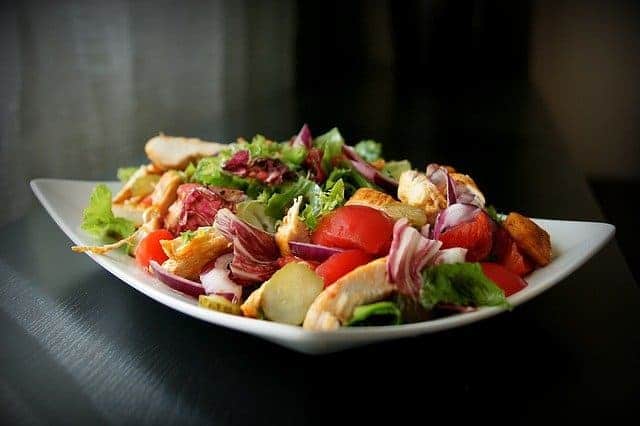
There can be no lack of carbohydrates in the workout diet. They are the main source of energy for our body. Thanks to carbohydrates the brain can work efficiently and quickly. Carbohydrate deficiency makes us more susceptible to fatigue and tiredness, headaches and dizziness, mental performance decreases, as well as physical performance deteriorates. Apart from energetic functions, carbohydrates also perform transport and building functions. They also ensure proper hormone levels and regulate metabolic processes.
Carbohydrates are the basic fuel for our muscles and they provide them with adequate strength and performance. For people who train, carbohydrates supplemented on a regular basis are also a protection against sudden drops in blood sugar levels and deterioration of psychophysical well-being. What’s more, carbohydrates protect us from catabolism, i.e. muscle breakdown caused by insufficient energy supply in relation to the needs of intensely working muscles.
If we want to ensure high energy levels, and therefore maximize our training potential, we need to ensure an adequate supply of carbohydrates. However, these carbohydrates should not come from unhealthy, processed products such as sweets or fast food, but from natural resources. The majority of carbohydrates should be complex carbohydrates, and to a lesser extent, simple carbohydrates. Simple carbohydrates are best consumed around the workout.
The best sources of carbohydrates in the diet of active people:
- whole grain cereal products such as: groats, brown rice, whole grain pasta,
- cereals (e.g. oatmeal, rye flakes, buckwheat flakes),
- bran (e.g. wheat bran, rye bran),
- vegetables,
- legumes,
- fruits,
- unsweetened juices and fruit and vegetable smoothies from a blender,
- grains,
- whole grain breads,
- natural honey.
Rule 6: Eat in a balanced way, take care of the right amount of meals!
Awell-balanced diet, with calories appropriately selected for your training goals and body’s needs, is a priority. The key role in the menu of physically active people is maintaining the right balance between the individual components of the diet. The recommended proportions between proteins, carbohydrates and fats are on average:
- carbohydrates – 50-60%,
- proteins – 20-30%,
- fats – 15-20%.
The menu must also not lack vitamins and minerals drawn mainly from vegetables, seeds and seeds, nuts, fruits.
The second important thing is the distribution of meals. Training, we are exposed to increased consumption of energy resources, so we should replenish them on an ongoing basis. 5 meals (2 large and 3 smaller) per day is the optimum.
About 2 hours before the workout we should eat a larger meal to be able to exercise with maximum efficiency. Just before and just after your workout you should consume a portion of simple carbohydrates. About 1 hour after your workout you should eat a solid lunch or dinner to compensate for energy loss and optimize recovery.

